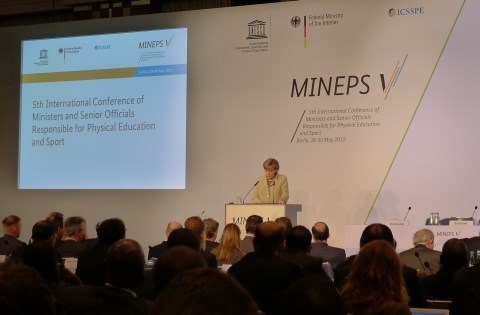Berlin Declaration: 137 countries call for enhanced effort against match-fixing and corruption

The German chancellor, Angela Merkel, speaking at the conference in Berlin. Photo: Play the Game
01.06.2013
By Søren BangBERLIN: Along with other types of corruption, match-fixing in sport is considered a problem of such importance that an enhanced cooperation between governments, sports organisations and other stakeholders is required. That was one of the conclusions made when UNESCO ended its fifth world conference of sports ministers, named MINEPS V.
The final statement, the ‘Berlin Declaration’, is not a legally binding document and is generally characterised by soft wording in addressing its three subjects: access to sport as a fundamental right for all, promoting investment in psysical education and sport programmes and preserving the integrity of sport. Nevertheless, according to UNESCO, the document should work as a sports political guide for the 137 participating countries, all of which unanimously adopted the declaration. Large parts of the declaration are dedicated to accentuating the direct and often cross-border threats to the values and integrity of sport such as match-fixing, doping and other forms of corruption.
”Again and again we have experienced how quickly fair and clean competitions become endangered when we see systematic or deliberate rule breaking, attempts to manipulate, doping or corruption. It is massively damaging for sport’s otherwise good image and undermines the values it represents,” said the German chancellor, Angela Merkel, at the opening of the conference.
Along with UNESCO general secretary Irina Bokova, Merkel called for global action from governments. How this call can be set into concrete political initiatives was more vaguely answered at the conference, just as the final declaration primarily focuses on match-fixing, and to some extend doping, while a number of international federations’ internal issues regarding corruption, lack of transparency and democratic governance are only briefly and indirectly touched upon. However, the declaration urges sports organisations to promote open, democratic decision-making as a prerequisite for sport to maintain its integrity, credibility and sustainability.
The governments are also looking to examine whether internationally coordinated monitoring and action against corruption is a feasible path to take. And contributions from several countries, including Spain and Uganda, proved a rising impatience regarding corruption in sport from all parts of the world.
Access to sport for all
Alongside the warnings of the shadowed sides of sport, the governments affirm that access to sport is a fundamental right for all regardless of ethnic origin, gender, age, impairment, cultural and social background, economic resources or sexual orientation. Such a principle is far from trivial in all parts of the world. On top of that, the declaration also states that broader sports participation should be encouraged through investment in sports facilities, national sport strategies and closer cooperation between authorities, sports organisations and other stakeholders.
But many of the contributions from participating governments showed a rather narrow and traditional focus on investments in traditional sports competitions and elite sports events as a way to stimulate broader sports participation, even though some countries did ask for a much broader perspective on sport.
Sports events must be controlled
The declaration is most direct on the issue of investment in mega-events, an issue that also plays a prominent part in the text. The declaration accentuates that big sporting events may have a positive influence on economy and society but that the growth of the biggest events during recent years not only narrows down the number of countries able to bid but also result in over-scaled facilities or other social and economic costs.
On these grounds, the declaration urges the international federations to consider how to lower the financial, technical and political requirements for the host countries while at the same time securing that the awarding of hosting rights is dealt with in an open, inclusive and transparent process.
More specifically, UNESCO suggests the sports organisations to consider maximum cost limits for bids, maximum capacity limits of new facilities and to introduce a stronger emphasis on sustainability when awarding the hosting of sports events. UNESCO’s press release.
-
Lord David Triesman,
UK,
04.06.2013 10:39:
It is an extraordinary state of affairs that an international forum has to intervene in dealing with criminality in sport. No doubt those in the most affected sports will say politicians should stay out and mind their own business. But the fact intervention is needed is also the reason why we should all doubt whether the international sports bodies will truly cooperate. When they have finished complaining they will switch to delaying. It is time to set time limits and make verifiable change unavoidable with sanctions for failure. Written with regret but in a spirit of hard-learned realism.





